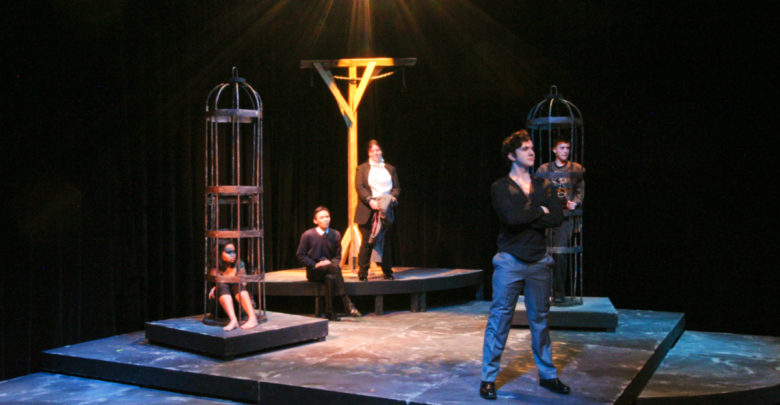Review: U of A New Works Festival (Night A)
These two student plays are nothing short of brilliant
 Supplied
Supplied Ran by the University of Alberta Department of Drama, the annual New Works Festival featured productions of four new plays by UAlberta students and alumni. The festival, completely student-run and produced, offers students from Drama and even other departments the chance to flex their artistic talents as writers, actors, designers, directors, and more.
happy now by Claudia Kulay, directed by Cassie James
happy now is relentless; it begins guns blazing and never lets up. Following Devin (Jasmine Hopfe) as they navigate mental illness, institutionalization, medication, and the way these things affect their relationship, the play immerses the audience in the mind of someone living with mental illness. Devin searches for happiness, but it eludes them at every turn as they battle against their own mind.
To some viewers, the play will be disorienting, or even confusing; its self-proclaimed surrealism is characterized by a nonlinear narrative that blurs the lines between what’s real and what’s happening inside Devin’s head. But the play resists understanding specifically because mental illness resists understanding; its seemingly illogical structure mirror the lack of logic inherent in living with mental illness.
Jasmine Hopfe sells Devin’s confusion and their desperation for someone to “just listen, please.” Her performance is gutting as we see Devin lash out at people around them, while struggling to care for themselves, take their meds, and see their therapist. In some ways, the play’s centring of Devin makes the other characters feel peripheral. While Erin is skillfully portrayed by Kristin Unruh, her needs and wants feel irrelevant in the face of Devin’s chaotic mind. Regardless, a strong cast sees their full potential under Cassie James’ careful direction, rendering a difficult script continuously engaging onstage.
Joe Semenoff’s sound design, which casts funereal string music over Devin’s most desperate moments, makes the play’s crises feel all the more immediate. Set design by Kelsie Howlett and Michael Jenkins creates a dull, colourless backdrop for the play’s many moments of violence and terror. Despite the ways they hurt people around them, we find ourselves rooting for Devin, and the play rewards us for following them on their often painful journey.
People in Cages by Matthew Hackett, directed by Ben Osgood
A comic farce following the long-form executions of two medieval “criminals,” People in Cages is often self-indulgent. The play uses the victims’ impending deaths to explore the philosophy of creating meaning in one’s life, and while the debate is a necessary one, the script often abandons its central question — what does it mean to be a human being — in favour of comedy. While certainly funny, especially Alex Rondeau as the despondent and insecure Towncrier, the play would be more compelling if it focused more on the predicaments of its three central characters.
Maria (Lara Roda) and Reginald (Jordy Harvey) are doomed to die; from the outset, the audience knows there is no escape for them. The Undertaker, comically played by Spenser Kells, is initially callous and unfeeling, but as he develops friendships with the criminals, finds himself questioning his central beliefs in an unfair system of capital punishment and hierarchal power. The characters are compelling, as are their individual backstories and relationships to the system that condemns them. But, interrupted as they are by the play’s philosophical interjections, it’s hard to invest in their relationships. The addition of Jean Metzinger, Jean-Paul Sartre, Karl Marx, and Friedrich Nietzsche as hallucinations who try to explain the meaning of life is funny at first, but eventually feels like being trapped in a 100-level philosophy course you didn’t sign up for.
People in Cages is redeemed by its production, however; director Ben Osgood clearly understands comic timing, and makes the most of the play’s abundant metadramatics and dramatic irony. Its set is starkly grim, in contrast to much of the script, and it’s endlessly engaging to watch Roda and Harvey act in the limited spaces of their cages. The performances by Kells, Harvey, and Roda delicately balance comedy with the script’s darker leanings, especially in its second half, inviting the audience into a play which, if not flawless, is never boring.




